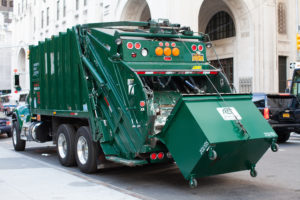While many businesses and individuals may not realize it, there are a lot of everyday materials and goods that can’t be tossed in the garbage. From used light bulbs to half-finished cans of air freshener, there are many seemingly innocuous items that if trashed, could land your business in trouble.
These materials are called universal waste, and since 2006, the Universal Waste Law has made it illegal for residents or small businesses to dispose of anything that falls within its remit into the trash. But what is universal waste and how can your businesses properly manage it?

What is universal waste?
According to the Environmental Protection Agency, universal waste is hazardous waste that is widely produced by a variety of individuals and organizations including most businesses and homes. It may include common items such as batteries, fluorescent lamps, televisions, computers, and other electronic devices as well as less common items such as mercury thermometers, and other mercury containing equipment.
While the Universal Waste Act covers a core set of products and materials, each state has its own set of regulations as to what constitutes universal waste. Here, we explore how universal waste differs from general hazardous waste and how each state approaches the problem.
What is the difference between universal waste and general hazardous waste?
It’s important to note, while all universal waste is hazardous waste, not all hazardous waste is universal waste.
 Hazardous waste includes anything that, when disposed of, has the potential to cause or contribute to an increase in death or serious illness, or pose a threat to human health or the environment. This means it includes everything from used light bulbs in a residential home to used cooking oil to the sludge leftover from industrial processes.
Hazardous waste includes anything that, when disposed of, has the potential to cause or contribute to an increase in death or serious illness, or pose a threat to human health or the environment. This means it includes everything from used light bulbs in a residential home to used cooking oil to the sludge leftover from industrial processes.
Many of these waste types are not common, and universal waste only covers those that are very likely to be disposed of by a home or small business. Every office in America, for example, will likely discard a few batteries and a can of air freshener at some point. Many, however, will be producing much more than just a handful.
What’s more, the scope of what is included as universal waste by the Environmental Protection Agency’s Universal Waste Program has increased over time since the first iteration.
What is considered universal waste according to the EPA?
The federal Universal Waste Program, which defines universal waste and the rules for how it is dealt with, was first established by the EPA in 1995. At that time, it covered “the environmentally sound collection and… proper recycling or treatment of hazardous waste nickel-cadmium and other batteries, certain hazardous waste pesticides, and mercury-containing thermostats.”
Since then, more categories have been added and there are now five types of Universal Waste outlined by the EPA:
 Batteries
Batteries
One of the first waste items to be included under the Universal Waste Program, this includes all batteries except for spent lead-acid batteries, which are managed under different provisions.
 Pesticides
Pesticides
Covering a broad range of pesticides, but only if they are a recalled, suspended, or canceled stock; or if they have been collected as part of a waste pesticide collection program. Otherwise, they should be dealt with according to other waste management legislation.
Mercury-Containing Equipment
This is any device (or part of a device) that includes mercury, according to the Title 40 of the Code of Federal Regulations (CFR) part 273. This could include things such as switches, relays, and thermometers, but not batteries and lamps, which are covered under their own categories. It also excludes devices that once contained mercury-containing components that have since been removed.
Lamps
This covers a comprehensive range of lightbulbs as found in many businesses, including fluorescent, high-intensity discharge, neon, mercury vapor, high-pressure sodium, and metal halide lamps. While the EPA doesn’t explicitly mention LED lamps, which are increasingly common in homes and offices, they would seem to fall under the very broad definition of what constitutes a lamp: “…the bulb or tube portion of an electric lighting device. A lamp is specifically designed to produce radiant energy, most often in the ultraviolet, visible, and infra-red regions of the electromagnetic spectrum.”
Aerosol Cans
Products in aerosol cans are often hazardous in their own right, but the Universal Waste Program is concerned with the propellant, which is why the definition includes any “non-refillable receptacle containing a gas compressed, liquefied, or dissolved under pressure, the sole purpose of which is to expel a liquid, paste, or powder and fitted with a self-closing release device allowing the contents to be ejected by the gas.”
It is important to note that empty aerosol cans (as defined by the Code of Federal Regulations) are not considered universal waste.
What is considered universal waste in different US states?
Most states have adopted the full federal Universal Waste Program, but others have only adopted some. On the other hand, a number of states have added their own materials that are classified as universal waste. For example, Maine, New Hampshire, and Rhode Island all have regulations regarding Cathode Ray Tubes (CRTs). While California and Hawaii both consider Solar Panels and Photovoltaic Modules as universal waste.
What’s more, many of these states have adapted versions of the same universal waste provisions. For example, Arkansas has adopted the federal program for lamps but excludes broken and crushed lamps/debris at a state level, and on a similar theme, Indiana has explicitly banned the intentional breaking or crushing of lamps.
How your business can deal with universal waste
The EPA outlines four participants in the universal waste system:
- Small quantity handlers of universal waste (less than 5,000 kg of universal waste),
- Large quantity handlers of universal waste (5,000 kg or more of universal waste),
- Universal waste transporters
- Universal waste destination facilities
Waste producers (which is likely to be your business) and those who collect it are both considered waste handlers and are thus both responsible for ensuring the proper disposal of any universal waste they may generate. This means that all parties are responsible for universal waste ultimately being processed at a proper facility that is permitted to receive hazardous waste.
If a business is looking to dispose of universal waste, then according to the EPA, they can send that waste to another waste handler, a foreign destination, or a destination facility, which is somewhere that treats, disposes of, or recycles a particular category of universal waste.
Generally speaking, universal waste can be stored for a year (once considered as waste) and does not require a manifest to be shipped or need a hazardous waste transporter to get it to the facilities mentioned above. However, each state does have its own requirements, so look at local legislation, work with local universal waste recycling hubs, or find a responsible waste management partner.
This can get very confusing very quickly so to clarify, it is worth looking at a hypothetical example:
A small business is renovating their offices and, in the process, discarding all their old lamps. The construction firm is taking this waste from the small business.
Both the small business and the construction firm are responsible for the proper end disposal of those lamps. What’s more, either one of them can store the lamps, which are now considered waste, for up to a year.
They contract a waste management firm to collect, recycle, and certify as destroyed the lamps so that both the small business and construction firm are in line with universal waste regulations.
Often, to ensure the proper disposal of universal waste, the simplest solution for a business is to partner with a waste management company such as RTS. We are able to comply with the various caveats of universal waste disposal, such as providing diversion reports and ‘Certificates of destruction’ verifying responsible recycling. What’s more, RTS can offer ongoing equipment and services to deal with the most common universal waste at your business, such as batteries or bulbs.
This includes services such as mail-back recycling, on-site storage solutions in line with universal waste regulations, and on-demand pickups.
To learn more about EPR and other issues facing the waste management industry, subscribe to our blog, or speak with one of our TRUE Waste Advisors.






